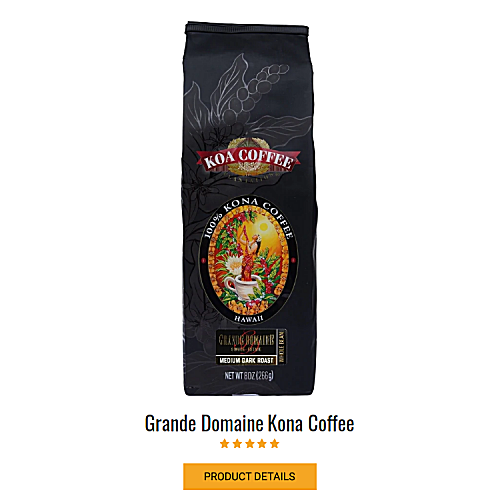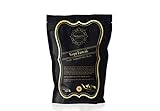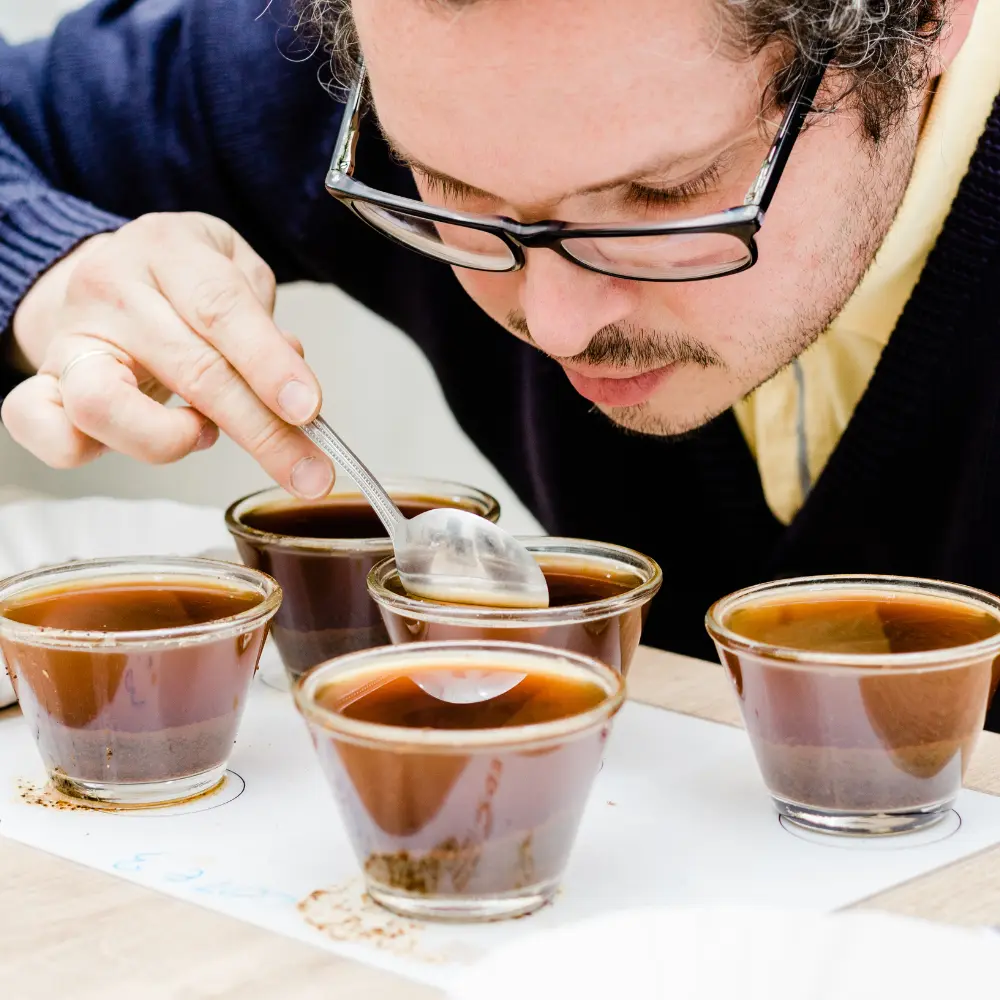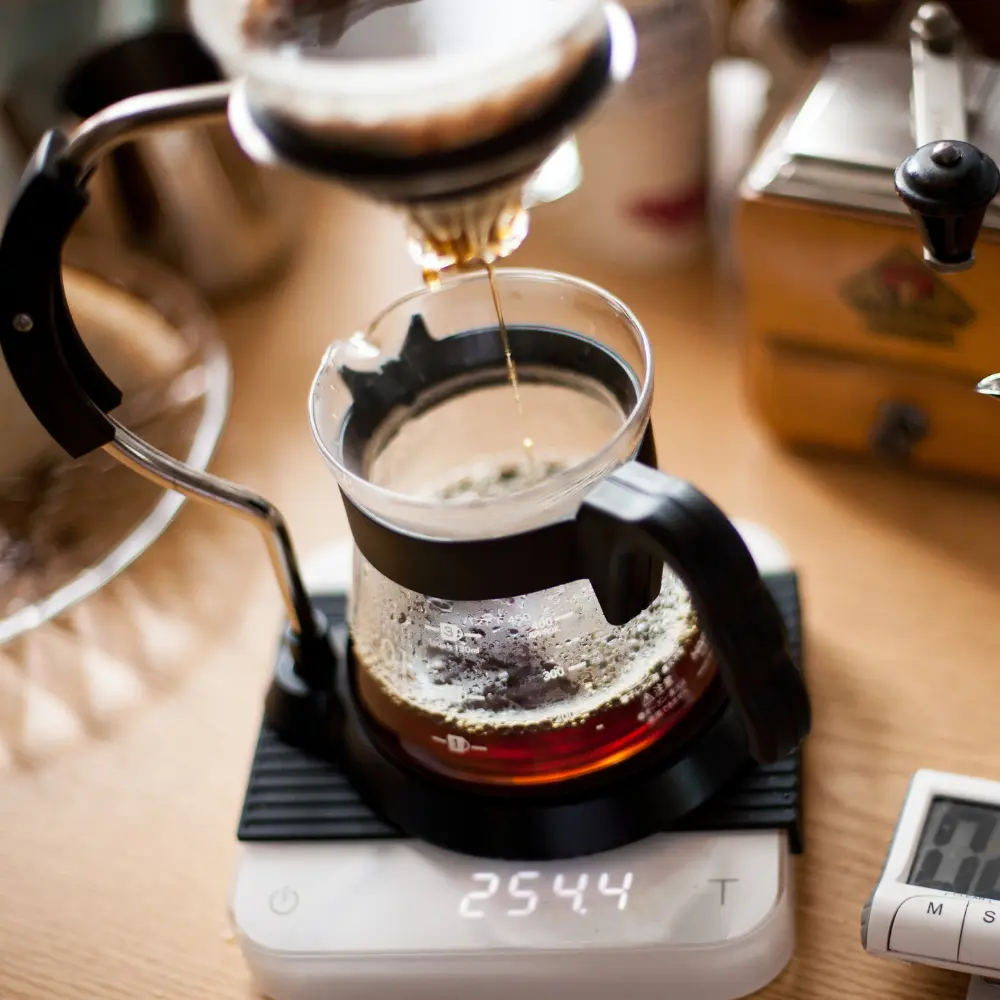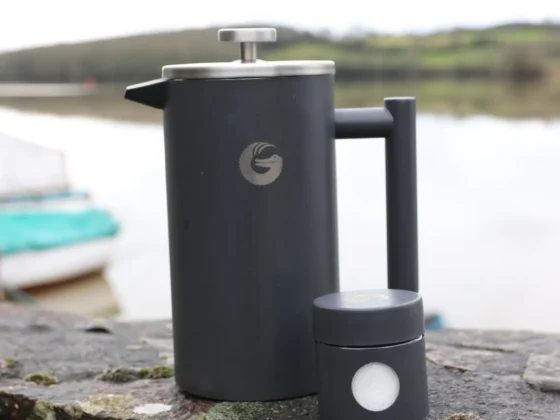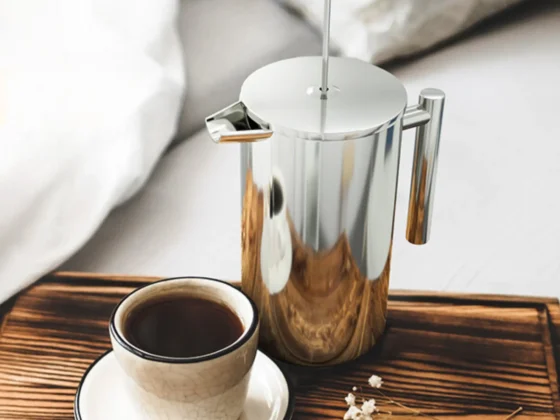Enter the alluring realm of kopi luwak coffee, also known as civet coffee, an exquisite beverage that has captured the fascination of coffee enthusiasts and connoisseurs alike. This definitive guide is expertly crafted to take you on an enthralling journey through the captivating history, distinct taste, and painstaking production process of one of the most exclusive and extraordinary coffee varieties on the planet. These civet coffee beans are enigmatic and have a narrative as deep as their flavor, and we’re thrilled to unravel the mysteries of this distinguished brew. So, whether you’re an adept coffee aficionado or an inquisitive novice, fasten your seatbelts and get ready to be engrossed in the captivating universe of this distinctive coffee.
What is Kopi Luwak Coffee? – Key Takeaway
- Kopi luwak coffee is a unique and rare coffee variety produced from beans that have been eaten and passed through the digestive system of a civet, which imparts a distinct flavor profile and aroma to the coffee.
- The production process of civet coffee is labor-intensive, involving the collection of beans from civet droppings, cleaning, fermentation, and roasting, which contributes to its high price and exclusivity.
- When it comes to taste, civet cat coffee offers a complex flavor profile with low acidity, and a smooth body, setting it apart from other coffee varieties.
- Authenticity and ethical concerns are crucial factors to consider when purchasing this distinctive coffee. It’s essential to research the company’s background, sourcing practices, and commitment to the welfare of wild civets and the environment before making a purchase.
- To fully appreciate the unique taste of kopi luwak coffee, try brewing it with a manual method such as a pour-over or AeroPress, which allows for better control over brewing variables and extraction of the coffee’s flavors. Remember to prioritize ethically sourced and sustainable options when making your choice.
The Intriguing History of Kopi Luwak Coffee
Civet coffee’s enthralling history is deeply rooted in the Indonesian archipelago, from its humble beginnings as a byproduct of Dutch colonialism to its current status as a highly prized specialty coffee. Let’s take a closer look at the origins, rise in popularity, and its place in the modern coffee industry.
Origins in Indonesia
Civet cat coffee traces its origins back to the Dutch colonial era in Indonesia during the 19th century. The Dutch established coffee plantations across the Indonesian islands, primarily in Java and Sumatra, utilizing the fertile volcanic soil to cultivate high-quality coffee beans. Local farmers, forbidden by the colonizers from picking coffee cherries for their own consumption, discovered a unique alternative in the form of beans ingested and excreted by the Asian palm civet, a small mammal native to the region. (1)
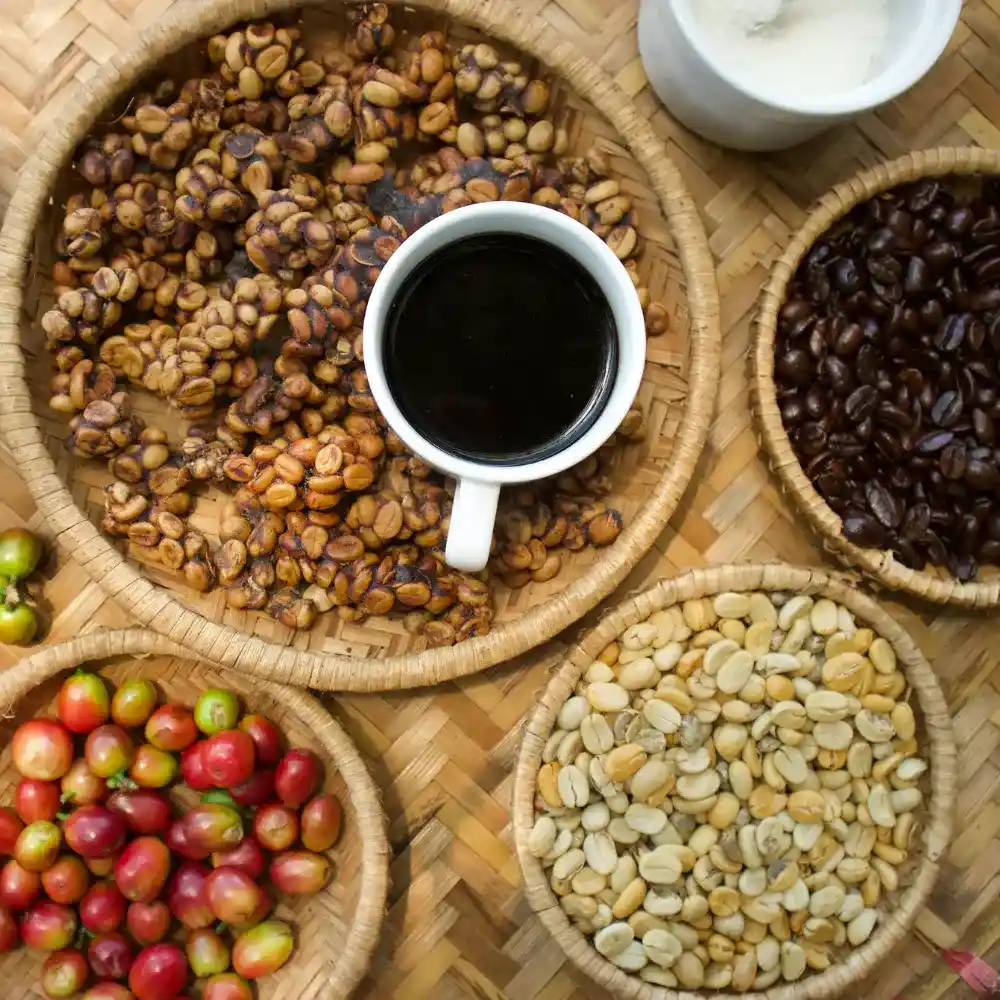
The civets, drawn to the ripest coffee cherries, would consume them and later excrete the beans undigested. The farmers collected, cleaned, and roasted these beans, creating a coffee that soon gained a reputation for its uniquely smooth and rich flavor profile. Thus, kopi luwak coffee was born, with “kopi” meaning “coffee” in Indonesian and “luwak” referring to the local name for the Asian palm civet.
Modern-Day Specialty Coffee Industry
Today, civet coffee beans hold a prestigious place within the specialty coffee industry. Its unique production process, limited availability, and exceptional flavor make it highly desirable among coffee connoisseurs worldwide.
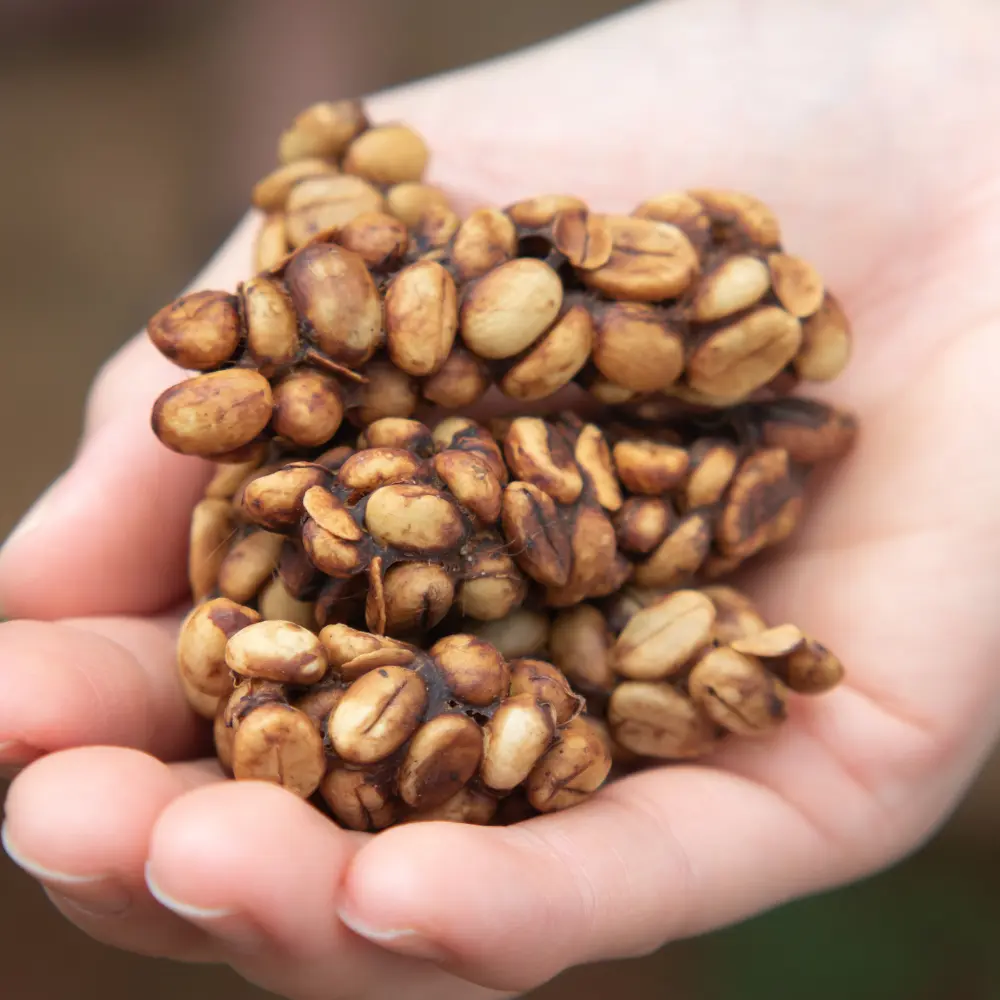
However, the modern-day popularity of kopi luwak has also brought about significant ethical concerns and challenges, as unscrupulous producers have resorted to intensive farming practices that harm the civets and damage the environment. (2) As a result, there has been a growing movement within the industry to promote sustainable and ethical production of civet coffee, ensuring that the luxury beverage remains a symbol of quality and tradition while also preserving the well-being of the civets and the Indonesian coffee industry.
Unraveling the Unique Taste of Kopi Luwak
At the core of this Asian palm civet coffee ‘s mystique is its unparalleled taste, a byproduct of the intricate interplay between the civet and the coffee cherries. To truly grasp the essence of the kopi luwak taste, it is indispensable to plunge into its flavor profile and characteristics, and comprehend the role of the civet in shaping those flavors.
Flavor Profile and Characteristics
Kopi luwak coffee taste is renowned for its extraordinary smoothness, low acidity, and multifaceted flavor profile. The beans produce a rich, full-bodied coffee with a velvety mouthfeel and a lingering, pleasing aftertaste. The tasting notes frequently entail glimpses of chocolate, caramel, and, on occasion, a nuanced fruitiness that depends on the particular coffee cherries ingested by the civets and the region in which they are sourced.
Another salient attribute of this coffee is its distinctive aroma. The beans exude a robust and earthy fragrance, often depicted as possessing a slightly woodland floor-like quality. This extraordinary scent contributes to the comprehensive sensory encounter of savoring civet cat coffee.
The Civet’s Role in Taste Development
The civet plays an indispensable part in producing the kopi luwak taste that has spellbound coffee aficionados worldwide. The process commences when the civet chooses and consumes the ripest and most savory coffee cherries. These cherries then pass through the civet’s digestive system, where enzymes disintegrate the cherries’ outer layer, revealing the beans inside. (3)
During this process, the beans undergo fermentation, which transforms their chemical composition and heightens their flavor profile. The civet’s digestive enzymes eliminate some of the usual coffee acidity and bitterness, resulting in an exceptional smoothness and richness.
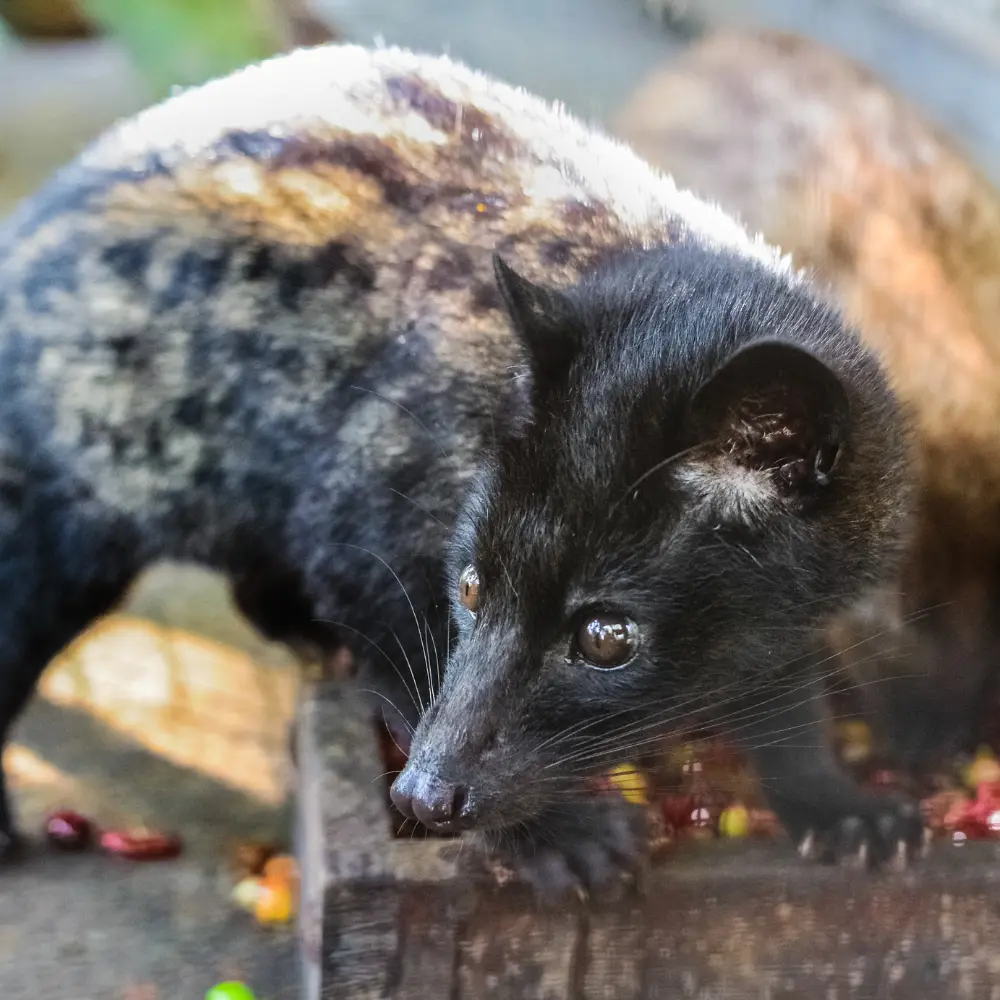
After being excreted, the beans are gathered, thoroughly cleaned, and roasted to perfection. The roasting process additionally advances and intensifies the kopi luwak taste, producing a one-of-a-kind coffee experience.
Comparisons to Other Specialty Coffees
Although kopi luwak occupies a unique position in the coffee world, it is crucial to evaluate its taste concerning other specialty coffees. Generally, this type of coffee is deemed a distinctive and lavish experience rather than a conventional coffee preference. Its low acidity and distinct flavor profile distinguish it from more customary coffee varieties like Ethiopian Yirgacheffe or Colombian Supremo.
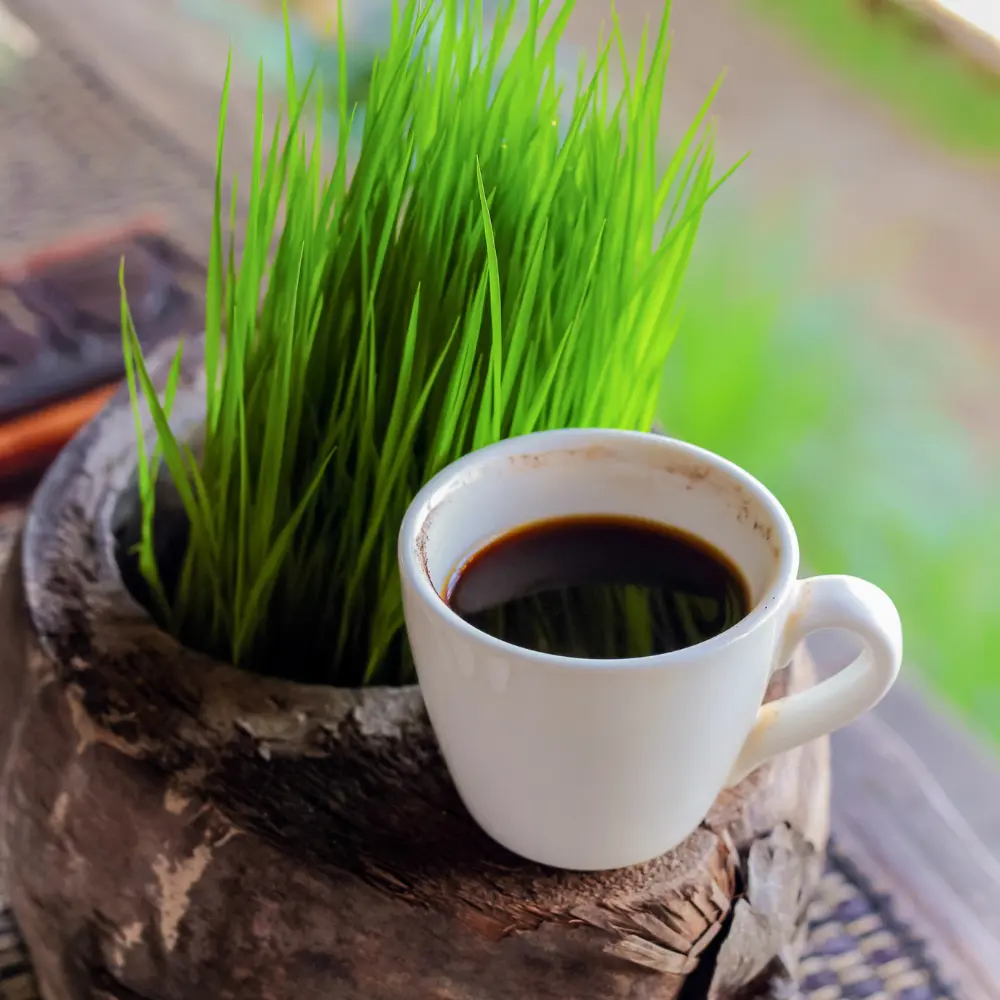
Nevertheless, kopi luwak taste may not suit everyone’s palate. Some coffee connoisseurs argue that other specialty coffees provide more subtle and intricate flavors, while civet coffee’s principal allure is its novelty and exclusivity. Ultimately, the most effective way to determine if civet cat coffee harmonizes with your taste preferences is to sample it alongside other high-quality, ethically-sourced specialty coffees.
The Production Process Behind Kopi Luwak Coffee
The unique kopi luwak taste and the rarity of kopi luwak coffee beans are products of a remarkable and intricate production process. From the wild civets’ selection of ripe coffee cherries to the fermentation process and the final steps of harvesting and roasting, let’s explore the journey of civet coffee beans from nature to your cup.
Civet Coffee in the Wild
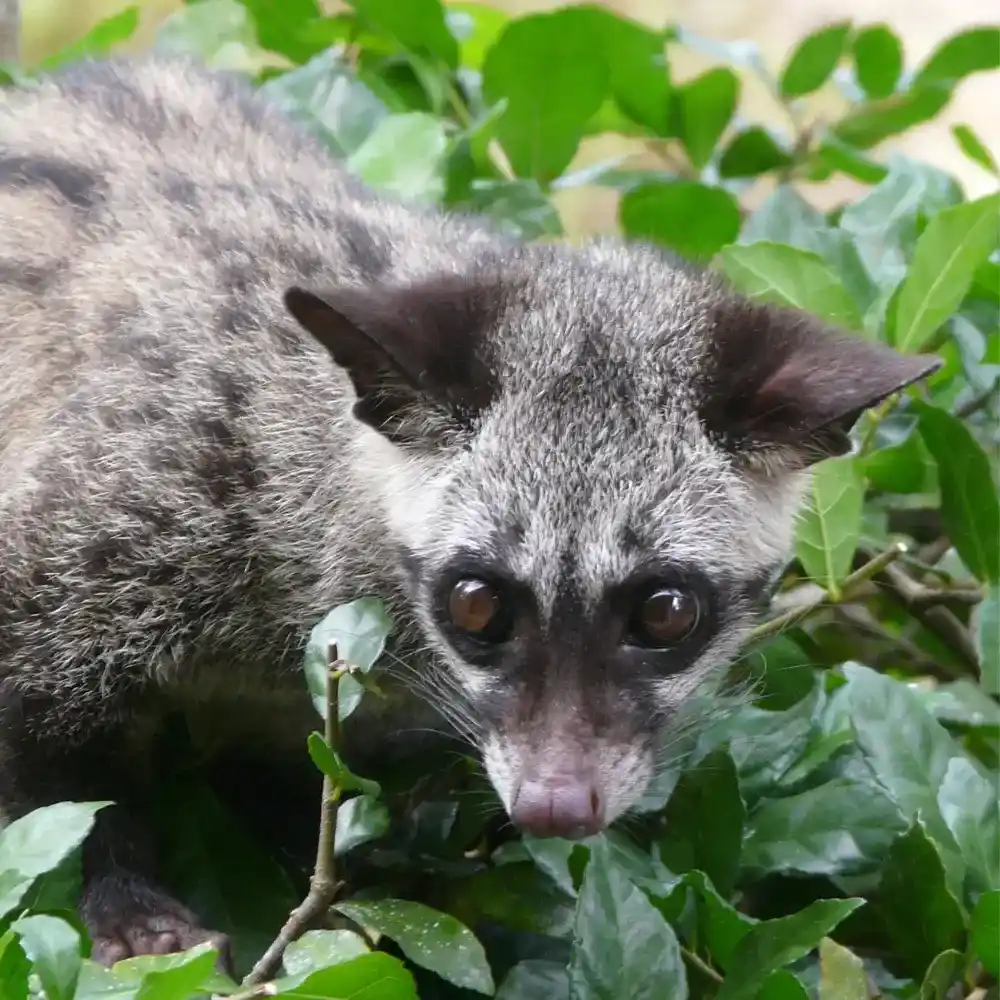
This distinguishable Asian palm civet coffee production starts in the wild, where Asian palm civets roam the coffee plantations in search of ripe and delicious coffee cherries. These nocturnal creatures are known for their discerning palates and have a preference for the sweetest and most mature cherries.
Once the civets consume the cherries, the undigested coffee beans pass through their digestive system, where the distinctive fermentation process begins.
The Fermentation Process
The fermentation process represents a crucial juncture in shaping the kopi luwak taste. As the cherries journey through the civet’s digestive system, the beans within are subjected to a myriad of enzymes and gastric juices. This chemical reaction dissolves the cherries’ outer layers and initiates bean fermentation.

During fermentation, the beans’ proteins break down into shorter peptides and free amino acids, which contribute to the silky and luscious flavor of civet coffee. The process also diminishes the beans’ acidity and bitterness; elevating their overall taste.
Harvesting and Roasting Techniques
After fermentation concludes, the kopi luwak coffee beans are expelled by the civet. The local farmers then meticulously retrieve the beans from the forest floor, making sure to avoid any adulteration. The beans are meticulously cleaned and sun-dried, a procedure that aids in eliminating any residual moisture and bacteria.

The subsequent stage in the production process is the roasting of the coffee beans. Expert roasters vigilantly oversee the roasting procedure to guarantee that the beans attain the optimal temperature and duration to bring out the kopi luwak taste’s finest qualities. The roasting process amplifies the beans’ innate flavors and confers a sumptuous, redolent quality on the final product.
After roasting, the beans are packed and dispatched to coffee aficionados worldwide, eager to partake in the unparalleled kopi luwak taste. This intricate and delicate production process, combined with the rarity of wild coffee beans, contributes to the exclusivity and luxury associated with this remarkable coffee.
Authenticity and Ethical Concerns
The growing demand for civet coffee beans and the coffee price have led to a surge in counterfeit products and unethical production practices. Understanding how this type of coffee is made, identifying genuine beans, and being aware of the dark side of civet coffee production can help consumers make informed decisions and support sustainable and ethical alternatives.
Identifying Genuine Kopi Luwak
With the rising popularity of civet coffee, counterfeit and low-quality products have flooded the market. Identifying pure civet cat coffee can be challenging, but there are some key indicators to look for when purchasing this luxury coffee.

Genuine kopi luwak coffee beans often come with certifications from organizations like the Specialty Coffee Association (SCA) or the Indonesian Coffee and Cocoa Research Institute (ICCRI). These certifications attest to the coffee’s quality and authenticity. Additionally, reputable sellers will provide detailed information about the source of their coffee beans and the production process, ensuring transparency and traceability.
It’s essential to be cautious of coffee beans sold at extremely low prices, as they may be counterfeit or produced using unethical methods. The rarity and intricate production process of this authentic coffee justifies the high kopi luwak coffee price
The Dark Side of Civet Coffee Production
As the demand for this distinctive coffee has amplified, so too have concerns about the treatment of civets and the sustainability of the production process. In some cases, civets are apprehended from the wild and held in cramped cages, where they are compelled to consume coffee cherries to maximize production. These practices are not only barbaric to the animals but can also adversely affect the quality and taste of the coffee.

Moreover, the expansion of civet coffee farming can exacerbate deforestation and habitat loss, jeopardizing the survival of wild civet populations and upsetting the delicate equilibrium of the local ecosystem.
Sustainable and Ethical Alternatives
To address these ethical concerns, some producers have shifted to sustainable and humane practices for civet coffee production. These methods prioritize the well-being of the civets and the conservation of their natural habitat.
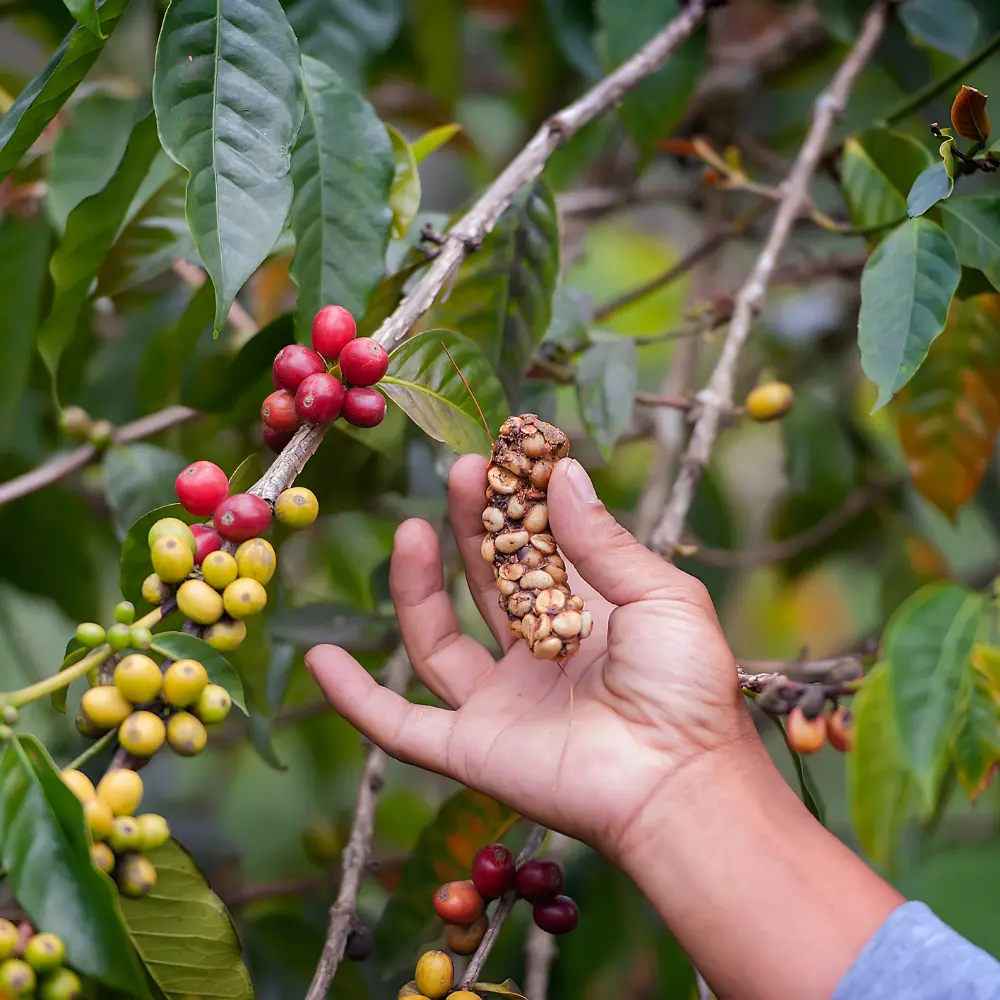
One such alternative is “cage-free” civet poop coffee, where the beans are obtained from wild civets that roam freely in their natural surroundings. This approach ensures that the civets are not exposed to inhumane conditions, and the coffee cherries are sourced ethically, mitigating the environmental impact.
Another option is to support coffee producers that adhere to stringent ethical guidelines and possess certifications such as Fair Trade, Rainforest Alliance, or UTZ Certified. These certifications ensure that the production process is sustainable and that the welfare of both the civets and the coffee farmers is considered.
By electing to purchase kopi luwak coffee beans from ethical and sustainable sources, consumers can enjoy the matchless kopi luwak taste while promoting conscientious coffee production practices.
Brewing and Enjoying Kopi Luwak Coffee

Now that you have a deeper understanding of how this exceptional coffee is made, it’s time to explore the best ways to brew and savor this luxurious coffee. From selecting the ideal brewing method to discovering the perfect food pairings, let’s dive into the world of enjoying this unique coffee experience.
Recommended Brewing Methods
Kopi luwak’s distinctive flavor profile shines through when brewed using the appropriate methods. To fully appreciate the taste, aroma, and mouthfeel of this exquisite coffee, consider using one of the following brewing techniques:
- Pour-over: This method allows for optimal control over water temperature, brewing time, and coffee-to-water ratio. By using a slow, steady pour, you can ensure even extraction and highlight the delicate flavors of civet cat coffee.
- French press: The immersion brewing process of a French press produces a full-bodied cup with a rich mouthfeel. This method is particularly well-suited for civet coffee, as it enhances the coffee’s natural smoothness and low acidity.
- Siphon: Combining elements of immersion and percolation, the siphon brewing method creates a clean, aromatic, and flavorful cup of coffee.
Regardless of the brewing method, it’s crucial to use freshly ground civet coffee beans and high-quality, filtered water to achieve the best results.
Pairing Suggestions
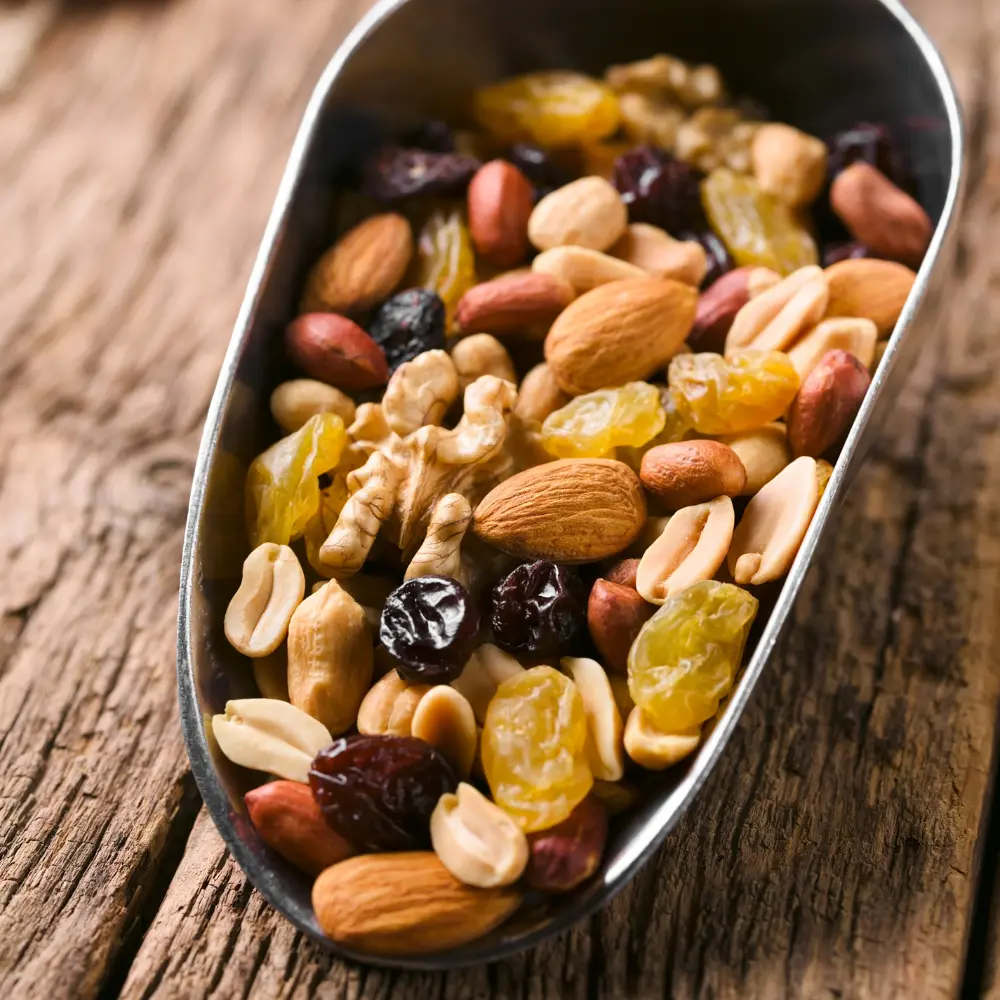
To elevate your coffee experience, consider pairing the coffee with complementary foods that accentuate its complex flavor profile. Some suggestions include:
- Dark chocolate: The rich, bitter notes of dark chocolate provide a delightful contrast to kopi luwak’s smooth, low-acidity taste, creating a harmonious balance of flavors.
- Nuts and dried fruits: The nutty and fruity undertones present in civet coffee can be enhanced by pairing it with almonds, hazelnuts, or dried fruits such as figs and apricots.
- Pastries and desserts: The sweetness and richness of pastries, like buttery croissants or decadent chocolate cake are also a great choice in creating an indulgent and satisfying coffee experience.
Where to Buy Authentic Kopi Luwak
To ensure you’re purchasing genuine kopi luwak coffee beans and supporting ethical production practices, it’s essential to buy from reputable sources. Look for sellers that provide detailed information about the origins, production process, and certifications of their coffee. Online retailers, specialty coffee shops, and high-end department stores are likely places to find an authentic form of these coffee beans.
Best Kopi Luwak Coffee
Finding the best coffee involves considering factors such as origin, quality, production methods, and ethical practices. Here, we will highlight some of the top civet coffee options that meet these criteria, ensuring that you can enjoy the unique taste of this luxury coffee while supporting sustainable and ethical production.
Volcanica Free-Range Kopi Luwak
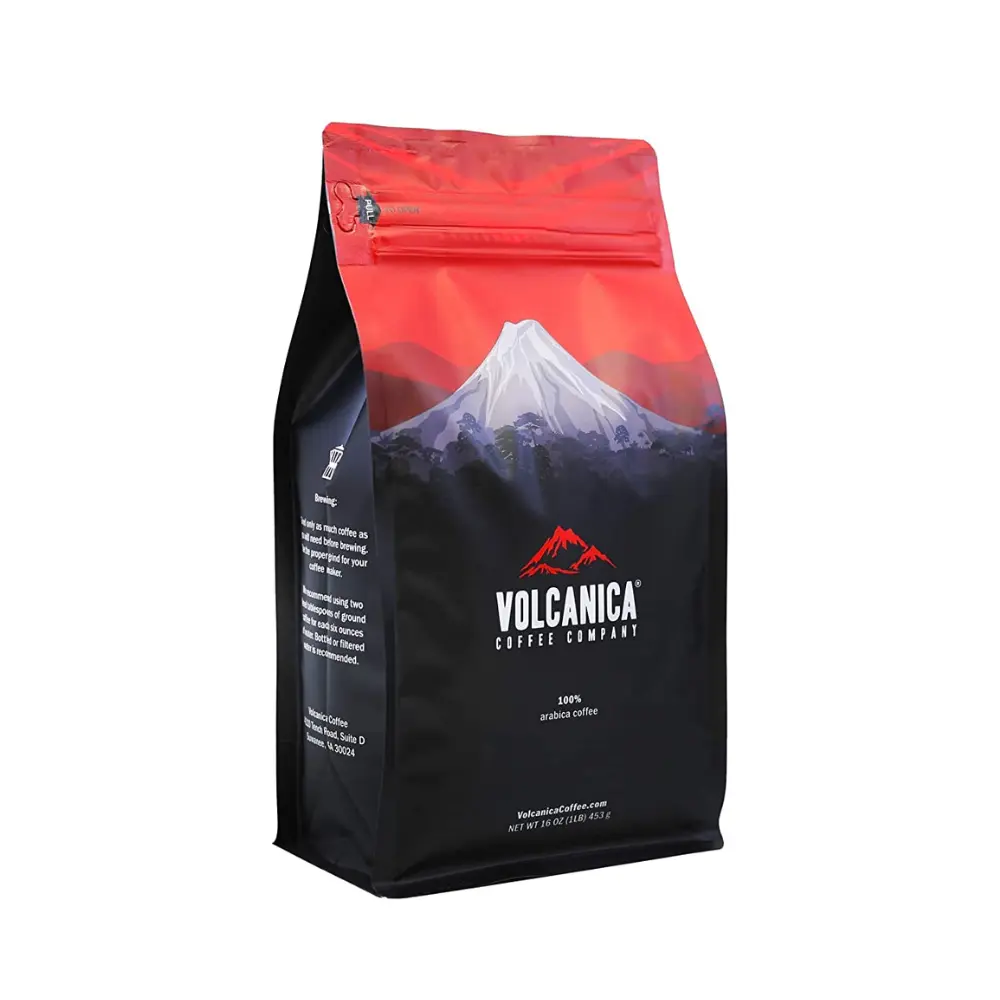
Volcanica Coffee Company’s Free-Range Kopi Luwak is sourced from wild civets that roam the coffee plantations in Indonesia. The beans are ethically collected, sun-dried, and roasted to perfection, resulting in a rich and smooth coffee with a balanced flavor profile featuring hints of caramel, chocolate, and tropical fruits. Volcanica Coffee is committed to sustainability and ethical practices, making their brand a responsible choice for coffee enthusiasts.
Kopi Luwak, the most expensive coffee in the world, available at Volcanica Coffee. Free Shipping.
- TESTED FOR MOLD, QUALITY AND SAFETY: Our coffee undergoes rigorous phytosanitary testing before export and lab analysis upon arrival to check for mycotoxins and mold. We then roasted at over 400°F, this meticulous process guarantees a fresh, safe, and impurity-free coffee experience.
- 100% Authentic Kopi Luwak Coffee Beans. Wild Civet coffee sustainably collected by a small farmer’s in North Sumatra, Indonesia.
- Wild Cage Free Civet coffee sustainably sourced and collected by small farmer’s in North Sumatra, Indonesia so no animals are harmed.
- Flavor Notes: Sandalwood, apricot, dark chocolate, plum blossom, musk and chanterelle-like mushroom. Intensely aromatic with a complex flavor profile, rich, strong flavored, and amazingly full-bodied, a perfect cup of coffee to savor.
- Whole Bean, 1 Pound Bag, Certified Kosher, The Most Expensive Coffee in the World famously known from the movie The Bucket List.
Shangri-La Coffee – Wild Kopi Luwak Coffee
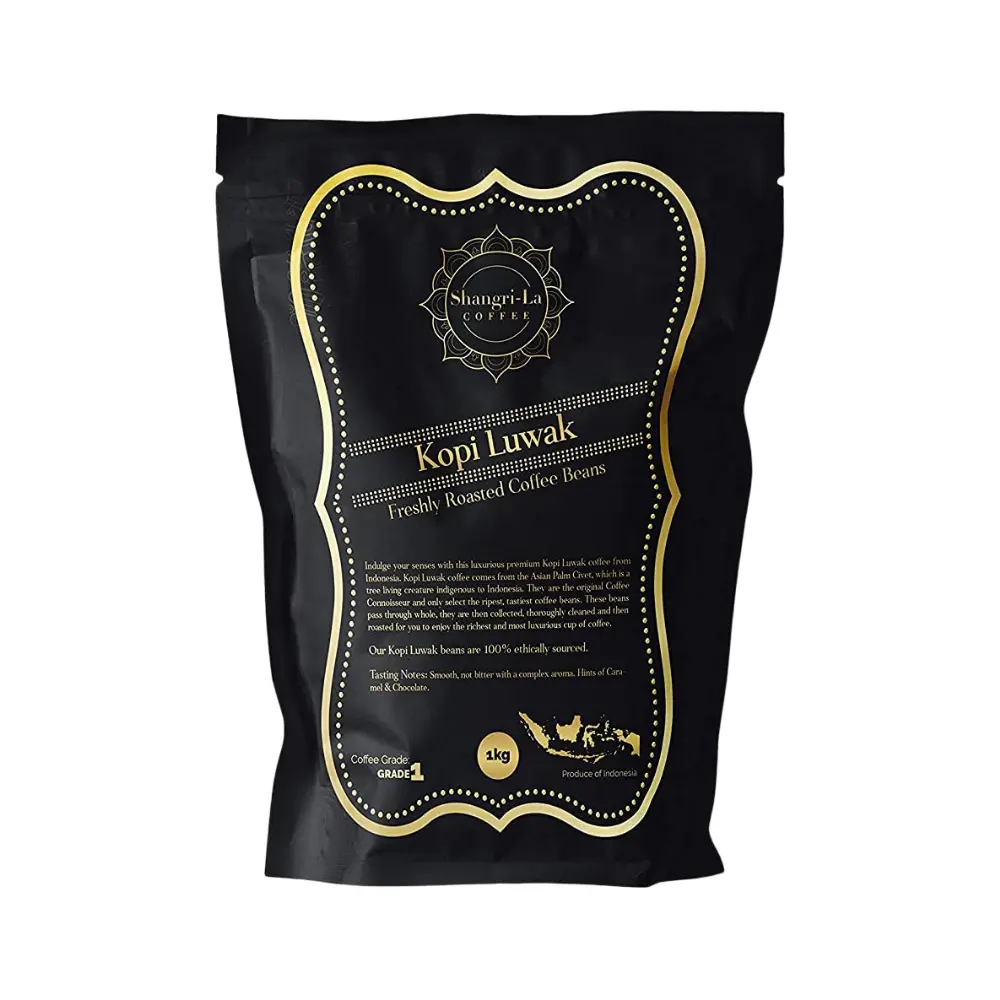
Shangri-La Coffee’s Wild Kopi Luwak is produced using beans collected from wild civets in the lush forests of Indonesia. The company follows strict ethical and sustainable practices in the harvesting and production of their coffee. The beans are handpicked, sun-dried, and roasted in small batches, resulting in a complex and aromatic coffee with notes of chocolate and caramel.
- Wild Ethically Sourced Premium Kopi Luwak Ground Coffee
- Roasted Whole Coffee Beans – 1 Kilogram
- Imported From Indonesia
- Tasting Notes: Smooth, not bitter, with a complex aroma. Hints of Caramel & Chocolate.
Monkey Business Coffee – Wild Kopi Luwak Coffee Whole Beans
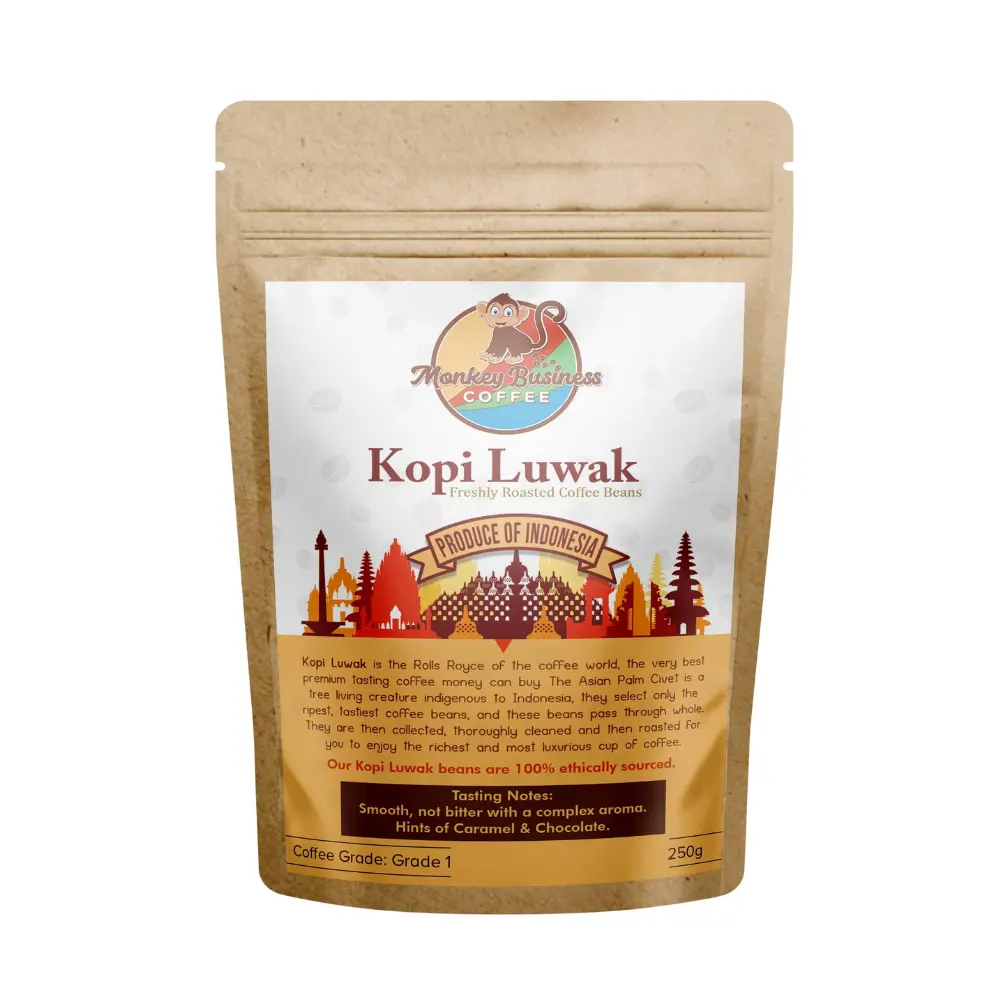
Monkey Business Coffee offers Wild civet cat Coffee Whole Beans sourced from free-roaming civets in the Indonesian coffee plantations. The beans are carefully processed and roasted, yielding a full-bodied coffee with a smooth mouthfeel, low acidity, and a delightful mix of chocolate and caramel.
- Wild Ethically Sourced Premium Kopi Luwak Ground Coffee
- Roasted Whole Coffee Beans – 5 Kilograms (176,3oz)
- Imported From Indonesia
- Tasting Notes: Smooth, not bitter, with a complex aroma. Hints of Caramel & Chocolate.
- 2 Bags Of Kopi Luwak Coffee – 1x 250g Whole Bean & 1x 250g Ground Coffee
- Wild Ethically Sourced Premium Kopi Luwak Coffee
- Imported From Indonesia
- Tasting Notes: Smooth, not bitter, with a complex aroma. Hints of Caramel & Chocolate.
- Great Christmas Present / Gift
- Wild Ethically Sourced Premium Kopi Luwak Ground Coffee
- Roasted Whole Coffee Beans – 1 Kilogram
- Imported From Indonesia
- Tasting Notes: Smooth, not bitter, with a complex aroma. Hints of Caramel & Chocolate.
Sea Island Coffee – Wild Kopi Luwak Civet Cat Coffee Beans
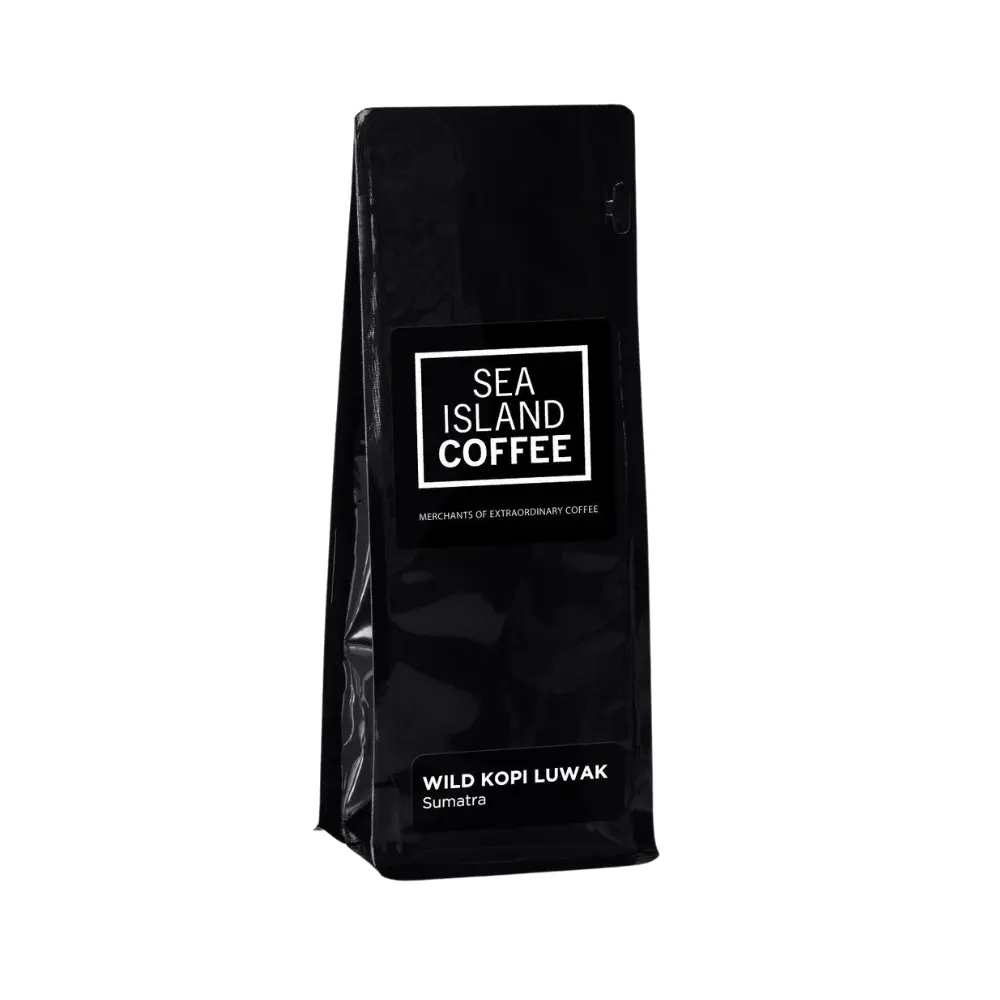
Sea Island Coffee offers Wild Civet Cat Coffee Beans sourced from wild civets that inhabit the coffee farms in Indonesia. The company places a strong emphasis on ethical and sustainable practices, ensuring the beans are harvested responsibly and the civets are treated humanely. The beans are processed and roasted to produce a delectable coffee with a velvety mouthfeel, low acidity, and a complex flavor profile that includes notes of chocolate, caramel, and hazelnut.
No products found.
Other Notable Civet Cat Coffee Brands
When selecting the best civet coffee, prioritize authenticity, ethical production, and sustainability. By choosing to purchase this delectable coffee from responsible sources, you can savor the rich flavors of this extraordinary coffee while supporting the welfare of the civets and the environment.
Conclusion: The Guru’s Take on Kopi Luwak Coffee
At The Coffee Guru, we are passionate about coffee and its incredible diversity. While civet coffee has a unique and intriguing history, we cannot ignore the ethical concerns that surround its production. Our commitment to promoting sustainable and cruelty-free coffee choices compels us to address the dark side of this distinctive coffee.
The production of kopi luwak coffee has led to the exploitation of civets in some cases, where they are caged and force-fed coffee cherries, causing them immense stress and suffering. We believe that coffee should be a source of pleasure and comfort, not a cause of harm to any living being.
With hundreds of amazing coffee varieties available, there is no need to compromise on our values in the pursuit of unique flavors. We encourage our readers to explore the incredible world of coffee without contributing to the unethical treatment of animals.
That being said, if you’re genuinely curious about this unique Asian palm civet coffee , then it’s a must-try on your bucket list. We recommend choosing an ethical and responsible producer. Our top choice is Volcanica Coffee Company’s Free-Range Kopi Luwak. This coffee is sourced from wild civets that roam Indonesian coffee plantations, ensuring that the animals are not subjected to cruelty or confined conditions. By supporting companies like Volcanica, you can indulge in a rich and unique coffee experience while promoting ethical and sustainable practices in the coffee industry.
In conclusion, while civet cat coffee is undoubtedly an interesting and unique aspect of the coffee world, The Coffee Guru prioritizes promoting ethical and sustainable coffee options. We encourage you to explore the vast array of coffee alternatives that do not involve animal cruelty and to make informed choices that align with your values.
FAQ
How can I ensure that the kopi luwak I buy is ethically sourced?
To ensure the coffee you purchase is ethically sourced, look for producers that emphasize transparency in their supply chain, prioritize the welfare of wild civets, and are committed to sustainable practices. Companies like Volcanica Coffee Company, which offers Free-Range Kopi Luwak, are good examples of ethical producers. Researching the company's background, checking for reviews, and asking questions about their sourcing practices can also help you make an informed decision.
Are there any certifications for genuine kopi luwak coffee?
There is no globally recognized certification for civet coffee. However, some organizations, like the Specialty Coffee Association of Indonesia (SCAI), certify the authenticity and quality of kopi luwak produced within Indonesia. It's essential to verify the credibility of such certifications and the organizations behind them before relying on them.
What other coffee varieties are similar in taste to kopi luwak?
While no other coffee variety perfectly replicates the taste of kopi luwak, some coffees share certain characteristics, such as low acidity, smooth body, and complex flavor profiles. Some examples include Ethiopian Yirgacheffe, Sumatra Mandheling, and Panama Geisha. Trying different single-origin coffees and experimenting with various roasts and brewing methods can help you find effective alternatives .
Can kopi luwak be brewed using a regular coffee maker?
Yes, it can be brewed using a regular coffee maker, such as a drip coffee machine, French press, or pour-over setup. However, to fully appreciate the unique flavors and nuances of this delectable coffee, it's recommended to use a manual brewing method like pour-over or AeroPress, which allows for better control over brewing variables like water temperature, grind size, and brewing time. This will enable you to extract the best possible flavor from the coffee.
